News Archive
Proceedings of VUW Logic Conference Published
31 May 2013 - 11:47 in Publication
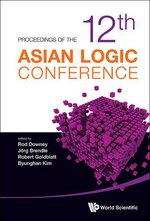 The 12th Asian Logic Conference was held at Victoria in December 2011, a major international conference organised by the School in a highly successful event that attracted over 100 researchers from around the globe. The proceedings of the conference have now been published by World Scientific, in an attractive volume prepared by a team of editors including Rod Downey (chair) and Rob Goldblatt. The book contains 18 research articles by 32 conference participants, covering a wide range of topics of current interest in mathematical and philosophical logic.
The 12th Asian Logic Conference was held at Victoria in December 2011, a major international conference organised by the School in a highly successful event that attracted over 100 researchers from around the globe. The proceedings of the conference have now been published by World Scientific, in an attractive volume prepared by a team of editors including Rod Downey (chair) and Rob Goldblatt. The book contains 18 research articles by 32 conference participants, covering a wide range of topics of current interest in mathematical and philosophical logic.
Postgraduate Study in Mathematical Logic
26 Feb 2014 - 13:31 in Publication
Postgraduate Study in Mathematical Logic
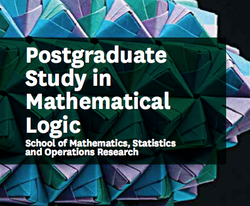 Leading in Research
The School of Mathematics, Statistics and Operations Research at Victoria University of Wellington, New Zealand, is home to one of the leading Mathematical Logic research groups in the world.
Recent graduates in mathematical logic have won national and international prizes for their thesis research.
The group conducts research in all the major fields of mathematical logic:
Leading in Research
The School of Mathematics, Statistics and Operations Research at Victoria University of Wellington, New Zealand, is home to one of the leading Mathematical Logic research groups in the world.
Recent graduates in mathematical logic have won national and international prizes for their thesis research.
The group conducts research in all the major fields of mathematical logic:
- Set Theory
- Computability Theory
- Proof Theory
- Model Theory
- Complexity Theory
New publication from Noam Greenberg
03 Apr 2014 - 15:58 in Publication
This new volume is edited by MSOR’s Noam Greenberg, together with former MSOR post-doctoral fellow Denis Hirschfeldt and two others. The book, in Cambridge’s Lecture Notes in Logic series, throws light on a broad range of approaches to the theory of computability in uncountable mathematics, a challenging but exciting new filed of research.
Turings Legacy
13 May 2014 - 10:27 in Publication
Turing's Legacy
New book by Prof Rod Downey - Turing's Legacy.
This booklet can also be found online:
Alan Turing was an inspirational figure who is now recognised as a genius of modern mathematics. In addition to leading the Allied forces' code-breaking effort at Bletchley Park in World War II, he proposed the theoretical foundations of modern computing and anticipated developments in areas from information theory to computer chess. His ideas have been extraordinarily influential in modern mathematics and this book traces such developments by bringing together essays by leading experts in logic, artificial intelligence, computability theory and related areas. Together, they give insight into this fascinating man, the development of modern logic, and the history of ideas. The articles within cover a diverse selection of topics, such as the development of formal proof, differing views on the Church–Turing thesis, the development of combinatorial group theory, and Turing's work on randomness which foresaw the ideas of algorithmic randomness that would emerge many years later.
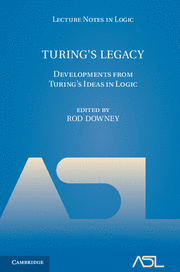

New book from Prof Rod Downey
10 Feb 2014 - 12:30 in Publication
New book from Prof Rod Downey and Michael Fellows.
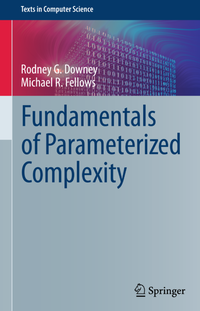 The field of parameterized complexity/multivariate complexity algorithmics is an exciting and vibrant part of theoretical computer science, responding to the vital need for efficient algorithms in modern society.
This comprehensive and self-contained textbook presents an accessible overview of the state of the art of multivariate algorithmics and complexity. Increasingly, multivariate algorithmics is having significant practical impact in many application domains, with even more developments on the horizon. The text describes how the multivariate framework allows an extended dialog with a problem, enabling the reader who masters the complexity issues under discussion to use the positive and negative toolkits in their own research.
Topics and features: describes many of the standard algorithmic techniques available for establishing parametric tractability; reviews the classical hardness classes; explores the various limitations and relaxations of the methods; showcases the powerful new lower bound techniques; examines various different algorithmic solutions to the same problems, highlighting the insights to be gained from each approach; demonstrates how complexity methods and ideas have evolved over the past 25 years.
The field of parameterized complexity/multivariate complexity algorithmics is an exciting and vibrant part of theoretical computer science, responding to the vital need for efficient algorithms in modern society.
This comprehensive and self-contained textbook presents an accessible overview of the state of the art of multivariate algorithmics and complexity. Increasingly, multivariate algorithmics is having significant practical impact in many application domains, with even more developments on the horizon. The text describes how the multivariate framework allows an extended dialog with a problem, enabling the reader who masters the complexity issues under discussion to use the positive and negative toolkits in their own research.
Topics and features: describes many of the standard algorithmic techniques available for establishing parametric tractability; reviews the classical hardness classes; explores the various limitations and relaxations of the methods; showcases the powerful new lower bound techniques; examines various different algorithmic solutions to the same problems, highlighting the insights to be gained from each approach; demonstrates how complexity methods and ideas have evolved over the past 25 years.
 The field of parameterized complexity/multivariate complexity algorithmics is an exciting and vibrant part of theoretical computer science, responding to the vital need for efficient algorithms in modern society.
This comprehensive and self-contained textbook presents an accessible overview of the state of the art of multivariate algorithmics and complexity. Increasingly, multivariate algorithmics is having significant practical impact in many application domains, with even more developments on the horizon. The text describes how the multivariate framework allows an extended dialog with a problem, enabling the reader who masters the complexity issues under discussion to use the positive and negative toolkits in their own research.
Topics and features: describes many of the standard algorithmic techniques available for establishing parametric tractability; reviews the classical hardness classes; explores the various limitations and relaxations of the methods; showcases the powerful new lower bound techniques; examines various different algorithmic solutions to the same problems, highlighting the insights to be gained from each approach; demonstrates how complexity methods and ideas have evolved over the past 25 years.
The field of parameterized complexity/multivariate complexity algorithmics is an exciting and vibrant part of theoretical computer science, responding to the vital need for efficient algorithms in modern society.
This comprehensive and self-contained textbook presents an accessible overview of the state of the art of multivariate algorithmics and complexity. Increasingly, multivariate algorithmics is having significant practical impact in many application domains, with even more developments on the horizon. The text describes how the multivariate framework allows an extended dialog with a problem, enabling the reader who masters the complexity issues under discussion to use the positive and negative toolkits in their own research.
Topics and features: describes many of the standard algorithmic techniques available for establishing parametric tractability; reviews the classical hardness classes; explores the various limitations and relaxations of the methods; showcases the powerful new lower bound techniques; examines various different algorithmic solutions to the same problems, highlighting the insights to be gained from each approach; demonstrates how complexity methods and ideas have evolved over the past 25 years.
New book by Downey and Hirschfeldt
01 Dec 2010 - 15:21 in Publication
Rodney G. Downey and Denis R. Hirschfeldt: 'Algorithmic Randomness and Complexity' (Springer, November 2010)
One of the most eagerly anticipated books for some years has finally been published. It is the first book in the new CiE book series "Theory and Applications of Computability". This mammoth work is a book destined to be a standard reference work in the field for many years.
For ordering details see the Springer webpage
or Amazon.
Here is the Springer page for the series.
New Publications
27 Apr 2009 - 16:32 in Publication
Two new books have been published by members of the School:
- "Statistical Methods for Demography and Life Insurance" by Estate Khmaladze
Moscow: URSS, 2009.
- "The Kerr spacetime: Rotating black holes in general relativity."
Edited by: David Wiltshire, Matt Visser, Susan Scott. Chapters by: Matt Visser, Roy Kerr, Roger Penrose, Brandon Carter, David Robinson, Ben Lewis and Susan Scott, Remo Ruffini, Fulvio Melia, Andrew Fabian and Giovanni Miniutti, Maurice van Putten, Steve Carlip, Gary Horowitz. ISBN: 9780521885126 [22 January 2009] Cambridge University Press.
see also: http://homepages.ecs.vuw.ac.nz/~visser/book4.shtml
- ... and an honourable mention in Nature Physics Research Highlights (April 2009) for a paper in Phys Rev D. by Gabriel Abreu and Matt Visser
"It's feasible, in quantum physics, to have a large negative energy density at a point - and with this comes all sorts of weird possibilities such as traversable wormholes and time machines. Fortunately, to stop things getting out of hand, there are constraints on average or total energy over a volume or line, such as that expressed in the 'quantum interest conjecture': overall, the energy density must be positive; negative energy density somewhere must be more than compensated for by positive energy density elsewhere. For the example of energy pulses, this means that the amount of negative energy in a pulse is constrained to be more than balanced by a larger positive-energy pulse; the time interval between such pulses is also restricted, according to the conjecture. The net energy of the two pulses, necessarily positive, is the 'quantum interest'. The quantum interest conjecture has already been proved in (1 + 1) Minkowski space, but now Gabriel Abreu and Matt Visser have taken it into more dimensions. By proving a variant of Simon's theorem for the biharmonic Schördinger equation, they have reformulated the conjecture for (3 + 1) Minkowski space. In fact, the result can be generalized to any Minkowski space that has an even number of dimensions."
Master of Applied Statistics 2015
26 Feb 2014 - 13:22 in Publication
Master of Applied Statistics 2015
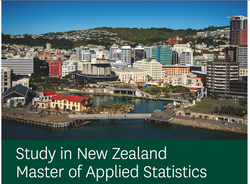 There is a growing national and international demand in government, the social and physical sciences, business and finance for statistics and quantitative analysis, which are required for interpretation of the great variety and quantity of data generated in the information age.
The Master of Applied Statistics is designed to train students in a range of advanced statistical techniques and to provide them with an appreciation of the variety of work undertaken by professional statisticians.
This one-year taught Master’s programme can be completed in three trimesters (March–June, July–Oct, Nov–Feb) full time or up to three years part time. Normally, students start the programme either in March or in July. Enrolments in November are also possible. Graduates of the programme will have developed strong research, analytical and communication skills.
There is a growing national and international demand in government, the social and physical sciences, business and finance for statistics and quantitative analysis, which are required for interpretation of the great variety and quantity of data generated in the information age.
The Master of Applied Statistics is designed to train students in a range of advanced statistical techniques and to provide them with an appreciation of the variety of work undertaken by professional statisticians.
This one-year taught Master’s programme can be completed in three trimesters (March–June, July–Oct, Nov–Feb) full time or up to three years part time. Normally, students start the programme either in March or in July. Enrolments in November are also possible. Graduates of the programme will have developed strong research, analytical and communication skills.
